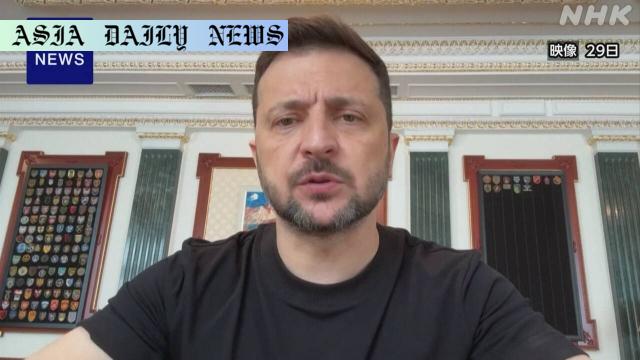Peace memorandum: Zelenskyy urges Russia to share its document as Ukraine emphasizes the importance of transparent peace talks.

Zelenskyy Puts Pressure on Russia for Transparent Peace Talks
Ukrainian President Volodymyr Zelenskyy has reaffirmed his demand for transparency from Russia in advancing peace talks aimed at resolving the escalating conflict between the two nations. Following a recent phone call with Turkish President Recep Tayyip Erdogan, Zelenskyy reiterated the importance of Russia presenting its peace memorandum for discussion. His statement underscores a pressing need for substantive, actionable steps in a crisis that has gripped global attention.
In response to Russia’s proposal for direct talks set to occur in Istanbul, Turkey next Monday, Kyiv remains steadfast in emphasizing the importance of reviewing each party’s peace documents in advance. The Ukrainian leadership has already sent its memorandum to Moscow and has accused Russia of deliberately withholding its response. Zelenskyy characterized this lack of transparency as a critical obstacle to achieving meaningful dialogue during his latest address.
Proposed Four-Party Talks: A New Diplomatic Avenue?
Another key development spurred by Zelenskyy’s conversation with Erdogan is the potential inclusion of broader international players such as the United States in the peace process. The Ukrainian President proposed a four-party meeting featuring high-level representatives from Ukraine, Russia, Turkey, and the United States. Such an initiative could potentially provide additional layers of diplomatic leverage, ensuring that discussions remain robust and impactful.
This proposal indicates Kyiv’s urgency in assembling a coalition that holds the power to encourage or compel Moscow to take a more cooperative stance in peace negotiations. However, it also raises questions about the feasibility of such an arrangement given the complexities in U.S.-Russia relations and ongoing geopolitical tensions.
Accusations of Concealment: Russia’s Lack of Resolve?
Zelenskyy has not held back in his criticism of the Kremlin. In his most recent video address, the Ukrainian President accused Russia of “concealing” its peace memorandum. This raises concerns about the sincerity of Moscow’s intentions to resolve the conflict. For Ukraine, reviewing Russia’s memorandum is a fundamental prerequisite for ensuring productive future talks. Without this prerequisite fulfilled, there is a growing fear that next Monday’s proposed meeting could ultimately lack substance.
The accusations also underscore wider trust issues between the two nations. Ukraine continues to face military aggression on its borders, which makes transparency and trust-building measures more essential than ever. For world powers observing these developments, the situation underscores the delicate balance between supporting peace-building efforts and holding parties accountable to ensure decisive action.
Commentary
The Importance of Transparency in Peace Negotiations
The call for Russia to provide its peace memorandum reflects a fundamental truth about successful diplomacy: transparency is key. Without clear communication and shared information, even the most ambitious peace processes can collapse under the weight of misunderstandings and mistrust. Zelenskyy’s firm stance on this issue is a reminder of the importance of honest dialogue between conflicting parties, especially in situations as charged as this one.
At its core, Ukraine’s demand for Russia’s memorandum highlights a commitment to ensuring that upcoming talks are meaningful rather than performative. This takes on heightened importance given the ongoing violence and the devastating effects it has had on civilians. Failing to approach these discussions with due seriousness sends a dangerous signal—not just to the participants, but to the global community that continues to watch and wait for a resolution.
The Potential Role of Turkey and the United States
The inclusion of additional international players offers both opportunities and challenges for the peace process. Turkey, as the proposed host for next week’s talks, is in a unique position to facilitate discussions given its geographical and geopolitical ties to both Ukraine and Russia. Meanwhile, the prospect of involving the United States introduces a major power player capable of adding pressure on Moscow while reaffirming global commitments to peace and stability.
However, these expanded talks will require delicate management. Conflicting interests among participating nations could complicate dialogue, further slowing progress toward agreement. The involvement of more stakeholders also raises the stakes for success, highlighting the need for all parties to act in good faith.
Moving Forward: Setting a Precedent
Ultimately, this moment in history presents an opportunity to establish a precedent for resolving conflicts through diplomacy and reason. Both Ukraine and Russia have a responsibility to take this opportunity seriously, as their actions in the coming days will carry long-lasting implications for the future of regional stability and international relations. For the broader global community, supporting a transparent and substantive peace process is not just a moral imperative but a practical one.
Zelenskyy’s insistence on reviewing memorandums ahead of time is not an unreasonable demand—it is, in fact, a necessary step. As the proposed talks in Istanbul draw closer, it remains to be seen whether Russia will rise to the challenge of engaging in meaningful, transparent dialogue. One thing, however, is clear: the world is watching closely, and the stakes could not be higher.


